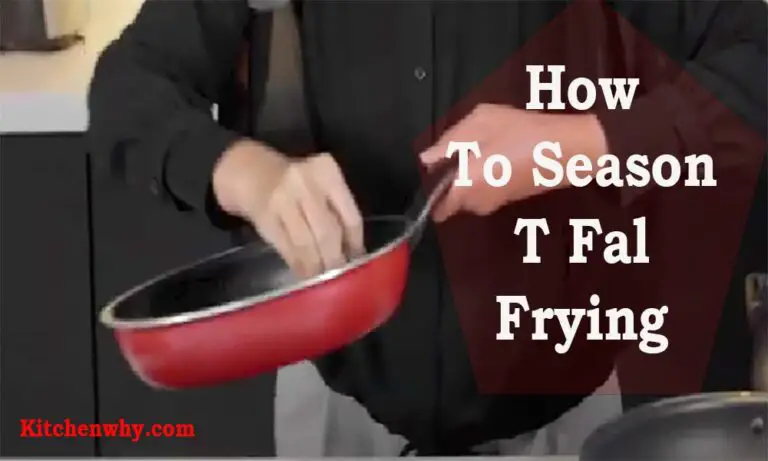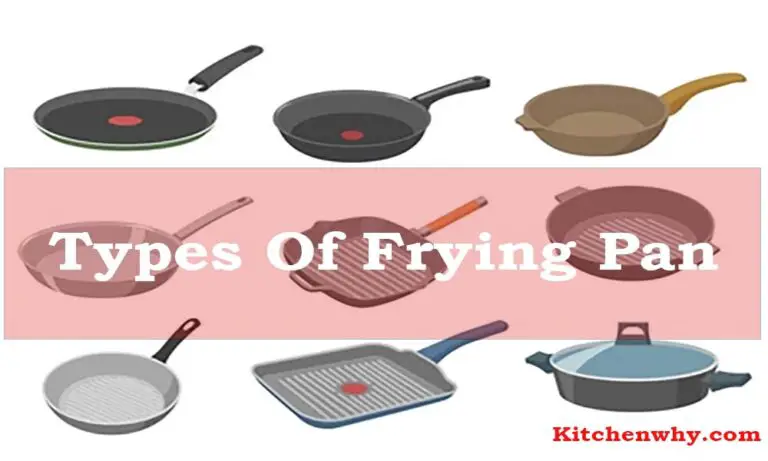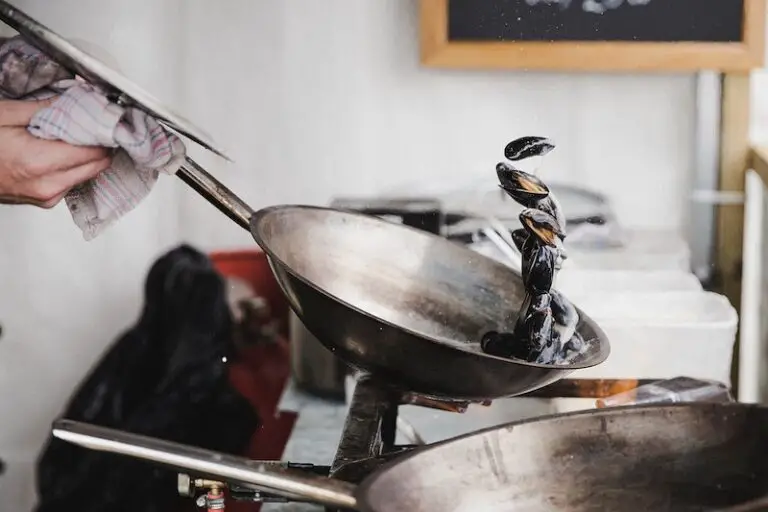Are Old Aluminum Pans Safe? Explained The Truth
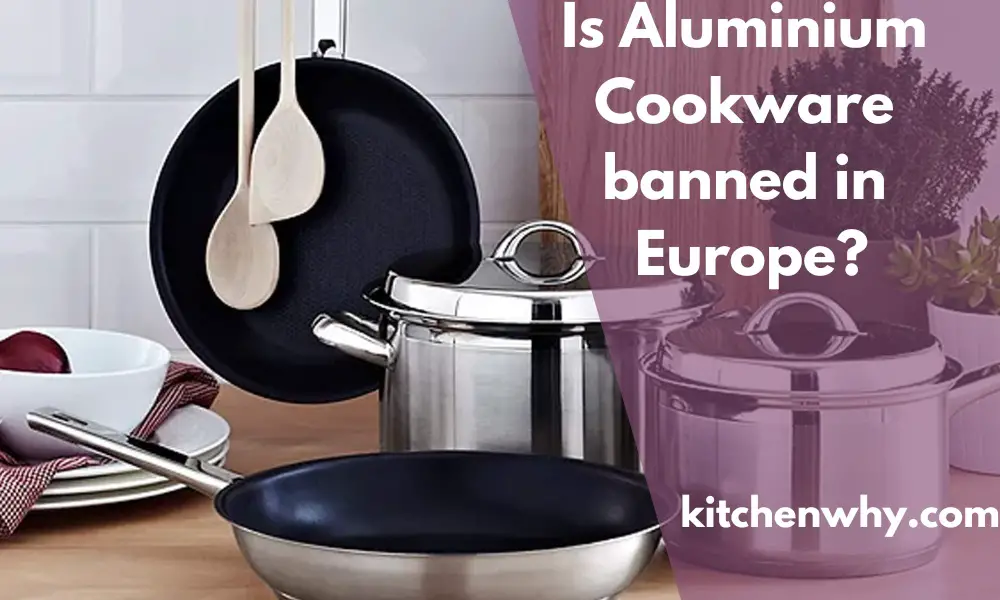
This post will answer the questionAre Old Aluminum Pans Safe? It will review the safety of old aluminum pans safe, how to properly care for old Aluminum Pans, and what brands are safe to buy.
Old aluminum pans may not be safe to use due to the possibility of aluminum leaching into food. However, using these types of pans for a short period of time may not cause harm.
When it comes to kitchen cookware, we often hear questions about the safety of using old aluminum pans. Aluminum is a common metal used in pans due to its excellent heat conductivity and lightweight properties. However, over time, these pans can corrode and lead to aluminum leaching into food.
This issue is particularly concerning for foods high in acidity or salt content. In this article, we will discuss the safety concerns of old aluminum pans, how to test for aluminum leaching, and alternatives to consider for safer cooking practices. So, let’s dive in!
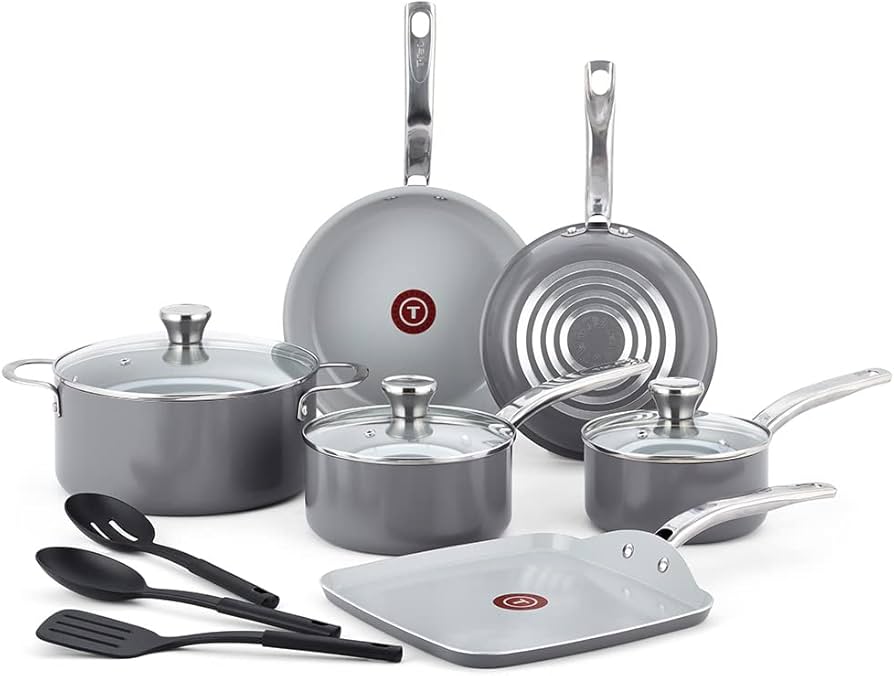
Credit: www.amazon.com
Are Old Aluminum Pans Safe?
Aluminum pans have been a staple in kitchens for many years due to their excellent heat conductivity and affordability. However, concerns have been raised regarding the safety of old aluminum pans. In this article, we will address the common misconceptions surrounding old aluminum pans and provide insights into their safety.
Understanding Aluminum and Cookware Safety: Aluminum is a lightweight metal known for its exceptional thermal conductivity. When used in cookware, it allows for efficient heat distribution and even cooking. However, there have been concerns about potential health risks associated with aluminum exposure.
- Aging and Oxidation: One common misconception is that old aluminum pans pose a greater risk than new ones. It is true that aluminum pans may oxidize over time, leading to the formation of a dull, grayish layer on the surface. However, this oxidation is typically harmless and does not affect the safety of the cookware.
- Acidic Foods and Aluminum: Another concern is the reaction between aluminum and acidic foods, which may result in the transfer of aluminum into the food. While aluminum can react with acidic ingredients, such as tomatoes or citrus fruits, the amount that actually leaches into the food is minimal and well within safe limits. Therefore, occasional use of old aluminum pans with acidic foods is unlikely to pose a significant risk.
- Non-Stick Coatings: Older aluminum pans may not have non-stick coatings, leading to concerns about food sticking and potential exposure to aluminum. However, these pans can still be used safely with proper cooking techniques, such as using sufficient oil or butter to prevent sticking.
Safe Usage Practices: To ensure the safe use of old aluminum pans, consider the following practices:
- Avoid Pitting or Corrosion: Inspect your old aluminum pans for any signs of pitting or corrosion. If the pans have severe damage or deep pits, it’s advisable to replace them, as these areas may be more prone to leaching.
- Regular Cleaning: Clean your aluminum pans regularly with mild dish soap and warm water. Avoid using abrasive cleaners or harsh scrubbing pads that may damage the surface. Proper cleaning helps maintain the integrity of the pan and reduces the risk of any potential contaminants.
- Use Protective Coatings: Consider using a protective coating, such as parchment paper or silicone baking mats, when cooking with old aluminum pans. These additional layers provide a barrier between the food and the pan’s surface, further minimizing any potential contact.
Contrary to popular belief, old aluminum pans can still be used safely with proper care and usage practices. The oxidation and minor reaction with acidic foods are unlikely to pose significant health risks. By inspecting and maintaining your old aluminum pans, practicing regular cleaning, and using protective coatings, you can continue to enjoy their benefits without compromising safety.
The Risks Of Using Old Aluminum Pans
Old aluminum pans have been around for decades, passed down from one generation to another. These pans have become an heirloom for some families. Most people think that using old aluminum pans is perfectly safe, but is it?
How Aluminum Pans Can Potentially Harm Your Health
Aluminum is a light and inexpensive metal, which can be a potential threat to our health if used excessively. Here are some health risks associated with using aluminum pans.
- Increased intake of aluminum – consuming food cooked in old aluminum pans can increase the intake of aluminum, which can have harmful effects on our health.
- Risk of Alzheimer’s disease – some studies claim that aluminum exposure can lead to the development of Alzheimer’s disease.
- Brain damage and impaired development – high levels of aluminum in the body can lead to severe brain damage and impaired development in infants and children.
Corrosion And Pitting – The Dangers Of Cooking In Old Aluminum Pans
Old aluminum pans can pose a serious risk to our health as they are more prone to corrosion and pitting. Here are some dangers associated with cooking in old aluminum pans.
- Leaching of aluminum – as these pans undergo corrosion and pitting, they can easily leach aluminum into our food, leading to an increased intake of this metal.
- Unhygienic cooking surface – old aluminum pans’ pitting and corrosion can create crevices and spaces on the cooking surface, making it challenging to clean thoroughly. This can lead to unhygienic cooking conditions.
Best Practices For Identifying Old Aluminum Pans In Your Kitchen
Identifying old aluminum pans in your kitchen can be a daunting task as they may not be labeled correctly. Here are some best practices for identifying old aluminum pans:
- Color – old aluminum pans have a characteristic darker gray color, as they have undergone years of wear and tear.
- Texture – aluminum pans have a smooth surface when they are new. Look out for pans with an uneven texture, as they may be old and worn out.
- Brand markings – many aluminum pans come with brand markings. Research the brand to determine the age of the pan.
It is essential to take the necessary precautions when it comes to using old aluminum pans. To ensure your health and safety, it is advisable to switch to newer and safer cooking utensils.
Understanding The Science Behind Aluminum
The Properties Of Aluminum And Its Impact On Cooking
Aluminum is a highly reactive metal that can easily bond with other elements, such as oxygen or acidic compounds. This property makes it a popular material for cookware, as it distributes heat evenly and quickly. However, aluminum can also pose a health risk when ingested in large amounts.
- Aluminum cookware can release small amounts of the metal into food during cooking, although the level of ingestion has not yet been determined to cause harm to human health.
- Corrosion of aluminum pans may occur over time, causing flakes of aluminum to stick on food. This is more likely when cooking acidic or salty food like tomato sauce or dishes that require vinegar, which can react with the metal ions.
How Aluminum Reacts With Different Types Of Food
Aluminum reacts differently with various types of food, depending on the ph level of the food being prepared.
- Acidic and alkaline foods (like citrus fruits or tomatoes) react highly with aluminum and may cause metallic aftertaste or slight discoloration on the surface of the cookware.
- Foods with high levels of salt can also cause aluminum to leach out of cookware, although the amount is small.
- In contrast, non-acidic foods like chicken or vegetables are less reactive and can be cooked safely in aluminum cookware.
The Role Of Ph Levels In Aluminum Cookware Safety
The ph level of the food being cooked plays a significant role in whether the use of aluminum cookware is safe or not.
- Alkaline substances like baking soda can react with aluminum, leading to holes or pits on the surface of the cookware, which can affect the cooking of foods.
- High acidity in food can cause the release of measurable amounts of aluminum, which can cause health concerns like alzheimer’s and other neurological diseases. However, the fda states that the level of aluminum in the diet is generally considered safe.
Aluminum cookware is widely used in kitchens worldwide due to its convenience, affordability, and heat transfer. However, there are concerns about its safety, especially in acidic and alkaline foods, with the amount of aluminum leaching being thought to be small.
Thus, it is best to use aluminum cookware for specific foods and avoid exposing it to excessively high temperatures while cooking.
Alternatives To Old Aluminum Pans
The Benefits Of Switching To Healthier Cookware
Cooking should always be an enjoyable and healthy activity, but when it comes to using old aluminum pans, things can turn sour. Aluminum cookware is known to be harmful and can react with acidic foods, which can lead to health issues.
Here are some benefits of switching to safer cookware:
- Non-toxic: Non-aluminum cookware doesn’t release harmful toxins, making it a healthier choice.
- Retains nutrients: Cookware made of other materials can retain nutrients, making them better options for health-conscious individuals.
- Even cooking: Other materials such as stainless steel and cast iron can distribute heat evenly, leading to better cooking results.
Different Types Of Non-Aluminum Cookware Available In The Market
Now that you know the harmful effects of using old aluminum pans, it’s time to explore other cookware options available in the market. Here are some of the most popular:
- Stainless steel: Stainless steel cookware is a popular choice due to its durability and even heat distribution.
- Cast iron: Cast iron is another go-to for home cooks due to its incredible heat retention properties.
- Ceramic: Ceramic cookware is an excellent choice for baking, and it’s easy to clean and maintain.
- Glass: Glass cookware is heat resistant, non-reactive, and allows you to see inside while cooking.
Tips For Buying The Best Non-Aluminum Cookware
When it comes to selecting the right non-aluminum cookware, you need to keep in mind a few things. Here are some tips for buying the best non-aluminum cookware:
- Research: Before buying any non-aluminum cookware, make sure to research and read up on the material, brand, and reviews.
- Quality: Look for high-quality cookware designed to last long and withstand high temperatures.
- Non-stick properties: Choose cookware with non-stick properties that are safe and durable.
- Price: While high-quality cookware can be expensive, the investment is worth it in the long run.
- Maintenance: Look for cookware that requires low maintenance and is easy to clean.
Switching to safer and healthier non-aluminum cookware is a small investment in your long-term health. With many options available, it’s essential to choose high-quality cookware that is durable, safe, easy to maintain, and within your budget. Happy cooking!
Taking Care Of Your Cookware
The Importance Of Proper Maintenance And Care For All Types Of Cookware
Taking care of your cookware is an important step in ensuring that it lasts for a long time. Proper maintenance and care can help keep your cookware in good condition, prevent damage, and maintain its quality. Here are some key points to keep in mind when it comes to the importance of proper maintenance and care for all types of cookware:
- Regularly clean your cookware to prevent buildup of food residue and other contaminants that may harm the material.
- Season cast iron pans before use to extend their life span.
- Avoid using steel wool or abrasive cleaners that may scratch or damage the surface of your cookware.
- Avoid high heat that may cause warping of your cookware.
- Never leave aluminum pans soaking in water as this may cause oxidation.
Best Practices For Cleaning And Storing Aluminum Pans
Aluminum pans are a popular choice for their lightweight and affordability. However, improper care can lead to oxidization, staining, and damage. Here are some best practices for cleaning and storing aluminum pans:
- Clean aluminum pans with soap and warm water immediately after use. You can also use a non-abrasive kitchen sponge or soft cloth to clean the pan.
- Avoid using abrasive cleaners or steel wool which can scratch or damage the aluminum surface.
- To remove stains from aluminum pans, use baking soda and vinegar solution. Mix one tablespoon of baking soda with one cup of white vinegar and apply it to the stained surface. Let it sit for a few minutes before wiping it away with a clean cloth.
- After cleaning and drying aluminum pans, store them in a dry, cool place to prevent oxidation.
Tips For Extending The Life Of Your Cookware
Cookware is an investment, and it’s important to take steps to protect it. Here are some tips for extending the life of your cookware:
- Use wooden or silicone utensils when cooking to prevent scratches.
- Avoid using high heat, especially with nonstick cookware.
- Allow pans to cool before washing or placing them in cold water, as rapid temperature changes can cause warping or damage.
- Store pans with a non-stick coating separately from other cookware to prevent scratches or dings.
- Use the right size and type of cookware for each task. For example, don’t use a small saucepan for cooking pasta.
Frequently Asked Questions On Are Old Aluminum Pans Safe?
Is It Safe To Cook With Old Aluminum Pans?
While aluminum cookware is generally safe, using old aluminum pans can lead to aluminum leaching into the food. High acidity in food like tomato sauce can cause more leaching and affect the food’s taste.
How Can We Identify An Old Aluminum Pan?
Older aluminum pans often have splotches, scratches, and discoloration. Some may have a rough bottom surface or be lighter in weight than newer models. Visually inspect the pan or look for a stamp/branding that can give you a hint on its age.
What Health Risks Are Associated With Aluminum Pans?
Excessive consumption of aluminum is believed to cause health problems such as alzheimer’s and liver diseases. While there is no direct proof of this yet, it is best to limit our exposure to aluminum by avoiding cooking with aluminum pans.
How Can We Use Old Aluminum Pans Safely?
Use a lining material such as parchment paper or silicone mats, to prevent food from coming into direct contact with the pan. Avoid cooking highly acidic foods in old aluminum pans. Limit the use of these pans, so they don’t get too hot and protect your food from leaching.
Can Aluminum Pans Be Recycled?
Aluminum is infinitely recyclable. Recycling old and unusable aluminum cookware is preferred over throwing them in the trash, where they could end up in landfills for decades. Be sure to check with your local recycling facility for their specific guidelines on recycling aluminum cookware.
Conclusion
Based on our discussion, it’s safe to say that old aluminum pans can be safe, but it depends on certain factors. The primary factor is the condition of the pan. If it’s scratched or has worn out, it’s best to replace it.
That’s because aluminum cookware with a damaged surface can cause the metal to leach into your food. Another factor is whether you’ve maintained the pan properly. If you have cleaned it properly and not used it for acidic foods, it can still be safe for cooking.
However, if you’re concerned about the safety of your cookware, you might consider other options. Cookware made of stainless steel, cast iron, or ceramic are all excellent alternatives. Keep in mind that investing in new cookware will not only keep you safe, but also improve your overall cooking experience.
Always prioritize safety and maintain your cookware to enjoy healthy and delicious meals for years to come.

